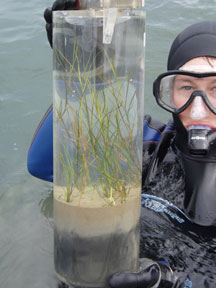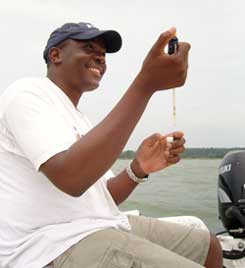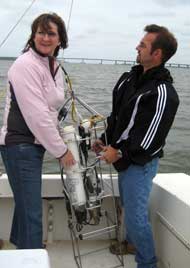 |
|
| SEARCH | TEACHER RESEARCH EXPERIENCE | ||||||
|
 The COSEE Coastal Trends Scientist-Educator Partnership immerses middle school and high school teachers in ocean science research experiences. Scientists and teachers conduct research and develop classroom resources based on the partnering work. Our program includes:
Collaborative teamwork is a key component of the research experience. Successful applicants work closely with a research scientist, a graduate student, and an undergraduate student to conduct research and collectively create web-based educational resources focusing on their area of study (see Scientist Educator Partnership for more details). Summer 2011 projects (June 23-Aug 5, 2011) Topic: Barrier Islands and Sea Level Rise Most of the potential future scenarios of climate variability and climate change are expected to have severe impacts on the natural resources, ecosystem, and visitor uses of Assateague Island National Seashore (ASIS). Expected changes in temperature and precipitation would likely lead to eutrophication and habitat degradation in the park’s shallow estuary, which comprises the majority (70%) of park acreage. Potential scenarios for sea level in 2100 would submerge 28% of the current terrestrial acreage, which as a low-lying barrier island is already susceptible to shoreline erosion and marsh inundation. Clearly, these sorts of climate change scenarios would lead to serious impacts on the park’s purpose, resources, and visitor uses. In order to improve communication about climate change impacts on the park, thereby increasing knowledge, understanding, and a sense of stewardship among target audiences, this project will develop a series of interactive and educational web pages. The teacher selected for this project will work with a team of scientists, science communicators, and college students to develop resources that will communicate ASIS resource issues and responses related to potential impacts of climate variability and climate change in order to increase awareness, understanding, and stewardship among park visitors, students, local residents, internal park staff, regional park planners, and others searching for information on impacts of climate variability and climate change on the park, the mid-Atlantic region, or barrier island ecosystems. Topic: Plankton and the Dead Zone Zooplankton are the gateway for energy and material flowing through the aquatic food web. The direct effects and behavioral changes of zooplankton caused by low oxygen can affect the food web in various ways. Scientists at the UMCES HPL are seeking to understand these effects and changes to zooplankton populations as well as implications for the overall aquatic food web. The teacher selected for this project will participate in scientific research and create web resources and lesson plans to communicate the research to 6-12th grade students. Under the direction of Dr. James Pierson, research is slated to include cruises on the Chesapeake Bay which will examine zooplankton responses to low oxygen by both surveying the study sites to locate the extent of low oxygen zones and conducting experiments at two stations - one with low oxygen levels and one with higher levels. A suite of measurements and experiments will be performed on the ship to look at where the zooplankton are in relation to their food, their predators, as well as the rates of feeding, reproduction, and migration of the zooplankton. In addition, laboratory experiments will quantify the sub-lethal effects of low oxygen on zooplankton growth and development. While learning about research and plankton ecology, the teacher will also develop educational materials to help convey Dr. Pierson’s research to broader audiences. We are no longer accepting applications for Summer 2011
|


